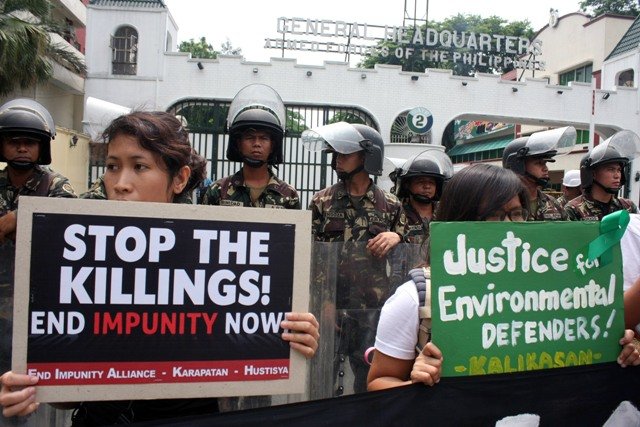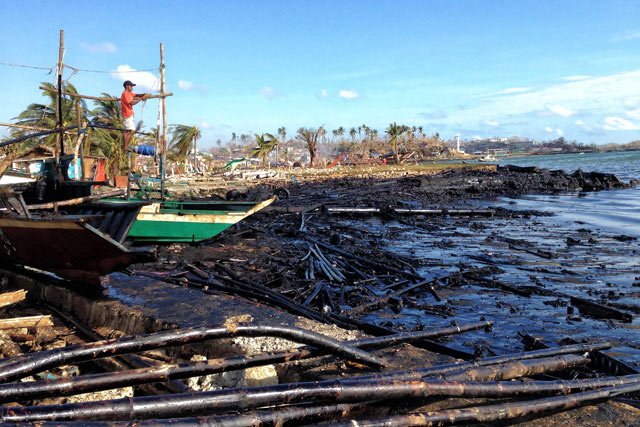URGENT ALERT
| UA Case : | Extrajudicial killing |
| Victim/s: | MARCELO C. MONTERONA, Jr.Male, 41, married with three children ages 16, 14 and 12Self-employed mechanic and driver
Resident of Maco town, Compostela Valley province Council member, Indug Kautawan, Maco chapter of Barug Katawhan (People Rise Up! a group of typhoon “Pablo” survivors in Maco) Member, Kabalikat Civicom – Maragusan Chapter |
| Place of Incident: | Near the victim’s house in Elizalde village, Maco, Compostela Valley |
| Date of Incident : | 3 January 2014 |
| Alleged Perpetrator(s): | Two unidentified men believed to be members of the 71st Infantry Battalion Philippine Army on board a motorcycle. |
Account of the Incident:
On 3 January 2014, Marcelo Monterona was fixing his multicab vehicle. At around 11:00 a.m., he went to Km. 11 on-board his motorcycle to borrow a sparkplug ring from his friend Edgardo Sedillo, a bakery owner. Sedillo’s bakery is about 600 meters from Monterona’s residence. While waiting for Sedillo, Monterona noticed seven army soldiers in uniform at a neighbourhood store across the street. Right after Monterona got the sparkplug ring, he returned to his house to continue fixing the multicab.
At around 12:00 noon, Monterona tested the multicab on the road in front of his house. He was some 13 meters from his house when two unidentified men, aboard an XRM motorcycle, stopped near the driver’s seat of the multicab. Witnesses said the gunman went straight to the driver’s seat and shot Monterona with a .45 caliber pistol, hitting him on the left side of his mouth. He tried to crawl out of the vehicle through the passenger’s side. But the gunman got on the vehicle through the driver’s side door and shot Monterona several times more before speeding away.
Monterona fell out of the vehicle and was rushed to a hospital in Tagum City by his wife and son. Sedillo, who was grazed by a stray bullet in the stomach, was also brought to the hospital.
Monterona was pronounced Dead On Arrival (DOA). Sedillo, who sustained minor injuries, was discharged of the hospital on the same day. From the hospital, Monterona’s remains were brought back to their residence in Purok 1, Sitio Waterfall, Barangay Elizalde, Municipality of Maco.
The following day, on 4 January, the Philippine National Police of Mawab arrived at the funeral parlor and examined the remains of Monterona. PO1 Haidan Ajiji said Monterona sustained six gunshot wounds.
Also on the same day, a Quick Response Team (QRT) from Davao City led by Karapatan-Southern Mindanao Region arrived to gather additional data on Monterona’s death.
The team recovered a tooth at the driver’s seat; the right wind shield of the multicab was hit and broken. The right door of the multicab also had two holes from gunshot and a splinter at the passenger’s seat. The day before, Monterona’s relatives recovered three empty shells and two slugs of .45 caliber pistols near the vehicle.
The witnesses said the motorcycle driver was medium-built, and with moustache. The gunman was skinny. He wore a yellow bullcap, yellow-green jacket, and black trekking short pants. His face was covered with handkerchief. The motorcycle had no nameplate. Also, neighbors noticed two men at a nearby store, whom they assumed were “spotters” or look-outs.
Monterona was an active Council member of Indug Kautawan. He actively participated in national and local campaigns against the large-scale and open-pit mining operations of the Apex Mining Company [1]. Last year, he and other victims of the typhoon Pablo/Bopha barricaded the gates of the mining company in Maco, paralyzing its operations. The protesters cited the mining company’s accountability for increasing the vulnerability of the people in Maco, when the typhoon hit their communities, as a result of its destructive mining operations. As a result of the protest, Apex agreed to indemnify the victims with PhP3.6 million, 300 sacks of rice, and to rehabilitate local infrastructure and the damaged communities.
Monterona also campaigned for the pull-out of 71st Infantry Battalion from the communities, criticized the military’s aerial bombings in the area, and demanded justice for the slain Pedro Tinga, also a member of Indug Kautawan, and other human rights abuses by the military. On 16-18 December 2013, during their barricade and lobbying at the Provincial Capitol of Compostela Valley in Nabunturan, he caught a military agent taking pictures of the protesters.
Recommended Action:
Send letters, emails or fax messages to call for:
The immediate formation of an independent fact-finding and investigation team composed of representatives from human rights groups, the Church, local government, and the Commission on Human Rights that will look into the killing of Marcelo Monterona and Pedro Tinga.
The end to the policy and practice of labelling and targeting of human rights defenders as “members of front organizations of the communists” and “enemies of the state.”
The withdrawal of Oplan Bayanihan, the Philippine government’s counterinsurgency program, that victimizes innocent and unarmed civilians.The Philippine government to observe the Universal Declaration of Human Rights and all the major Human Rights instruments that it is a party and signatory to.
You may send your communications to:
H.E. Benigno C. Aquino III
President of the Republic
Malacañang Palace,
JP Laurel St., San Miguel
Manila Philippines
Voice: (+632) 564 1451 to 80
Fax: (+632) 742-1641 / 929-3968
E-mail: op@president.gov.ph
Sec. Teresita Quintos-Deles
Presidential Adviser on the Peace Process
Office of the Presidential Adviser on the Peace Process (OPAPP)
7th Floor Agustin Building I
Emerald Avenue
Pasig City 1605
Voice:+63 (2) 636 0701 to 066
Fax:+63 (2) 638 2216
stqd.papp@opapp.gov.ph
Ret. Lt. Gen. Voltaire T. Gazmin
Secretary, Department of National Defense
Room 301 DND Building, Camp Emilio Aguinaldo,
E. de los Santos Avenue, Quezon City
Voice:+63(2) 911-6193 / 911-0488 / 982-5600
Fax:+63(2) 982-5600
Email: osnd@philonline.com, dnd.opla@gmail.com
Atty. Leila De Lima
Secretary, Department of Justice
Padre Faura St., Manila
Direct Line 521-1908
Trunkline 523-84-81 loc.211/214
Fax: (+632) 523-9548
Email: lmdelima@doj.gov.ph,
lmdelima.doj@gmail.com,
lmdelima.doj@gmail.com
Hon. Loretta Ann P. Rosales
Chairperson, Commission on Human Rights
SAAC Bldg., UP Complex
Commonwealth Avenue
Diliman, Quezon City, Philippines
Voice: (+632) 928-5655, 926-6188
Fax: (+632) 929 0102
Email: chair.rosales.chr@gmail.com,
lorettann@gmail.com
[1] Apex Mining Co. is largely owned by Mapula Creek Gold Corp, a subsidiary of Crew Gold Corporation based in the United Kingdom; and Mindanao Gold Ltd., a special purpose company formed by Malaysian investment company ASVI
Please send us a copy of your email/mail/fax to the above-named government officials, to our address below.URGENT ACTION Prepared by:
KARAPATAN Alliance for the Advancement of People’s Rights
2nd Floor Erythrina Building,
1 Maaralin Street, Brgy. Central,
Diliman, Quezon City,
1100 Philippines
Email: karapatan@karapatan.org | urgentaction@karapatan.org








